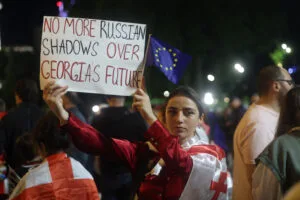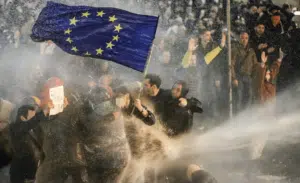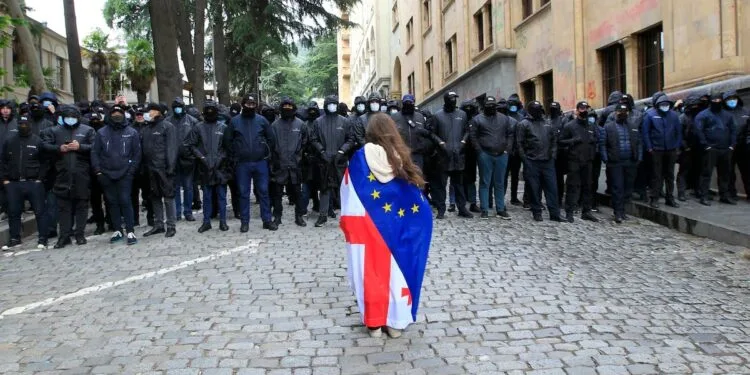Brussels – There was little doubt about the clash that the approval of the pro-Russian-inspired law on “transparency of foreign influence” would spark between the European Union and Georgia. Less predictable, however, was the nearly 24-hour wait for the release of the statement of condemnation by the EU High Representative for Foreign Affairs and Security Policy, Josep Borrell, after the idea of a joint statement by the twenty-seven countries had waned. Because, once again, the unity of the 27 member countries—and consequently of the Union—has been blocked by the resistance of Viktor Orbán’s Hungary, which, after obstructing the very drafting of the note by the 27 countries, has worked to slow down the work of the High Representative through its Commissioner for Neighborhood Policy and Enlargement, Olivér Várhelyi(co-signer).

“The adoption of this law negatively impacts Georgia’s progress on the EU path,” reads the statement published today (May 15), which urges the authorities in Tbilisi and the ruling Georgian Dream party to “withdraw the law, uphold the commitment to the EU path, and advance the necessary reforms detailed in the 9 steps.” It is a condemnation not as harsh as requested by MEPs and foreign ministers from 11 EU countries, but it is still highlighting a move by Brussels away from support for this government: “The EU stands ready to continue supporting Georgians working for a European future.” Ahead are Georgia’s October 26 general elections, and this could be no small lever to increase pressure on Georgian Dream and the prime minister, Irakli Kobakhidze.
The law on “transparency of foreign influence” was already presented last year by Georgian Dream and stalled after an oceanic wave of protests in March 2023. With a slight amendment to the text in early April, the law has been resubmitted by the government: All organizations that receive more than 20 per cent of their funding from abroad would have to register as an “organization pursuing the interests of a foreign power” (similar to “agent of foreign influence” in effect in Russia since December 1, 2022). After weeks of extremely high tension inside and outside the Tbilisi Parliament and tens of thousands of citizens engaged last Saturday (May 11) in the largest wave of protests since independence from the Soviet Union in 1991, yesterday (May 14), the Georgian Parliament accelerated the pace and passed the pro-Russian-inspired draft in third reading. At this point, the bill will be sent to the President of the Republic, Salomé Nino Zourabichvili, who has already announced that she will veto it, but Georgian Dream will be able to use its overwhelming majority in Parliament to override the veto and make the “transparency of foreign influence” become law.

Georgian demonstrators in Tbilisi against the “foreign influence transparency” law, May 14, 2024 (credits: Giorgi Arjevanidze / Afp)
“The EU has clearly and repeatedly stated that the spirit and content of the law are not in line with the core norms and values of the EU,” Borrell and Várhelyi’s statement reiterates, because it will “undermine the work of civil society and independent media.” However, freedom of association and expression are “fundamental rights at the core of Georgia’s commitments as part of any path to EU membership.” Despite the Candidate country status granted on December 14, 2023, from the European Council, it is no longer a secret in Brussels that the entry into force of the pro-Russian-inspired law would prevent the opening of EU accession negotiations since the same negotiations are tied to progress on European Commission recommendations on civil society freedom and combating disinformation.
Then there is the issue of violence exercised by riot police and officers in balaclavas against peaceful pro-EU protesters, as demonstrated several times in recent weeks and also during yesterday’s oceanic demonstrations. “The intimidation, threats, and physical assaults against civil society representatives, political leaders and journalists, as well as their families, are unacceptable,” is Brussels’ complaint in calling on the relevant authorities to “investigate these documented acts” with videos and direct testimonies.”The EU stands by the Georgian people and their choice in favour of democracy and Georgia’s European future.”
The complex relationship between the EU and Georgia

Georgian demonstrator’s pro-EU protests in Tbilisi, March 7, 2023 (credits: Afp)
Despite being granted candidate status for EU membership, the relationship between Brussels and Tbilisi remains particularly complex due to the disconnect between an overwhelmingly pro-EU population and a government of pro-Russian tendencies, the same one that applied to join the Union due to fears raised by Kremlin expansionism. Over the past two years, several episodes have highlighted the ambiguity of the ruling Georgian Dream party. In May 2023, flights between Georgia and Russia resumed after Moscow decided to lift the current ban, and the Caucasian country never aligned with the restrictive measures introduced by Brussels against the Kremlin after it invaded Ukraine. Last fall, the government also attempted to put under impeachment (subsequently failed) the President of the Republic Zourabichvili for a series of trips to the European Union that allegedly violated the powers of the head of state under the national Constitution.
However, the Georgian population has shown for years that it does not share the direction taken by the Georgian Dream, and this is one reason why the elections for parliamentary renewal on October 26 will be crucial. Straddling Brussels’ decision in June 2022 not to grant Georgia candidate status for the time being, two major pro-EU demonstrations took place in Tbilisi: a “March for Europe” to reiterate the people’s alignment with the values of the Union and a street call for government resignation (with no follow-up by the then Garibashvili-led executive). The common features highlighted from these demonstrations are the flags—white and red of the five crosses (national) and with the twelve stars on a blue field (of the EU)—placards with pro-European claims and the Georgian anthem mixed with the Ode to Joy. A year later, harsh widespread protests broke out in March 2023 (supported by Brussels), which led to the momentary shelving of the controversial bill on “transparency of foreign influence” until it was passed this spring amid a new wave of popular protests.
In this scenario, one should not forget Georgia’s particularly sensitive relationship with Russia, a country with which it borders to the north. Its candidacy for EU and NATO membership—enshrined in its national Constitution—has long been a cause of tension with the Kremlin. After conflicts in the 1990s with the two separatist regions of South Ossetia (1991-1992) and Abkhazia (1991-1993) following Georgia’s 1991 independence from the Soviet Union, on the ground, the situation was effectively frozen for 15 years, with troops of the newly formed Russian Federation defending the secessionists within the claimed territory. The attempt to reassert Tbilisi’s control over the two regions in the summer of 2008—wanted by then-President Mikheil Saakashvili—led to a violent Russian reaction on August 7, not only in repelling the Georgian army’s offensive but also leading to the invasion of the rest of the national territory with tanks and air raids for five days. Since then, Vladimir Putin‘s Russia has recognised the independence of Abkhazia and South Ossetia and has deployed thousands of soldiers to the two territories to increase its sphere of influence in the Ciscaucasia region, in violation of the August 12, 2008 agreements.
English version by the Translation Service of Withub










